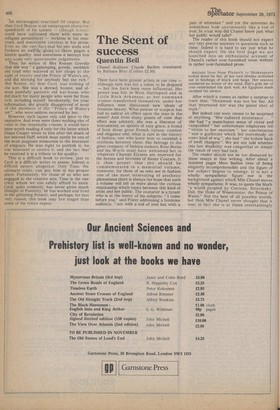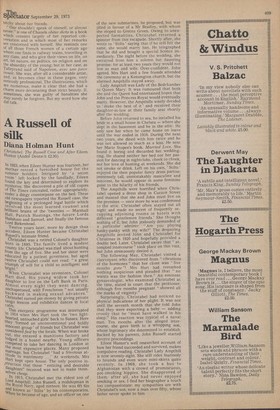The Scent of success
Quentin Bell
Chanel Solitaire Claude Baillen translated by Barbara Bray (Collins £2.50)
There have been greater artists in our time — although hers was not a talent to be despised — but few have been more influential. Her power was felt in West Hartlepool and in Little Rock Arkansas; at her command women transformed themselves, under her influence men discovered new ideals of feminine beauty. What painter or sculptor has had so radical an effect upon the man in the' street? And from many points of view that effect was salutary, she was a liberator of' womankind, an apostle of easy grace, a friend of both those great French virtues: comfort and elegance and, what is rare in the history of fashion, one who knew how to establish a synthesis between them. She belongs to the great company of fashion makers; Rose Bertin and les Worth must have welcomed her in whatever Champs Elysees are reserved for the heroes and heroines of Haute Couture. It is then proper that she should be commemorated in a memorial volume; moreover, for those of us who see in fashion one of the most interesting of aesthetic phenomena there is always the hope that such a volume will tell us more about the curious relationship which exists between this kind of artist and her public. The couturier is a tyrant who is at the mercy of his subjects. "I come before you," said Poiret addressing a feminine audience, "not with a rod of iron but with a pair of antennae" and yet the antennae do sometimes look uncommonly like a rod of iron. In what way did Chanel know just what her public would take?
The reader of this book should not expect any very precise answers to questions such as these. Indeed it is hard to say just what he should expect. On the first page we are launched into an enthusiastic account of Chanel's rather over-furnished room written in rather over-furnished prose.
Ancient lives from Plutarch to Shakespeare looked down'on her: all her own lifetime stretched out in bindings of black and beige. Her seasons numbered no winter of the mind. Dali's gold ear of corn embellished the dark wall. An Egyptian mask ravished the silence.
After which it comes as rather a surprise to learn that: "Ornament was not for her. All that interested her was the pistol shot of truth."
But indeed one soon ceases to be surprised at anything. "She radiated intolerance ... " she had "a manichaean sense of victor and vanquished" her unfortunate employees fell "victim to her exorcism ", her conversation was a guillotine which fell mercilessly on every kind of wig ", she had "the hollow back of swift chargers". We are not told whether this last disability was congenital or simply the result of very bad luck.
The reader should not be too dismayed by these essays in fine writing. After about a hundred pages Mme Baillen tires of being elegantly incomprehensible and the figure of her subject begins to emerge. It is not a wholly sympathetic figure nor is the background against which IVIlle Chanel moves wholly sympathetic. It was, to quote the blurb "a world peopled by Cocteau, Stravinsky, Dali, the Duke of Westminster, the Prince of Wales." Not the best of all possible worlds, but 'then Mlle Chanel never thought that it was; in fact she is at times entertainingly bitchy about her friends.
" One shouldn't speak of oneself, or almost never," is one of Chanels obiter dicta in a book Which consists largely of her reported cobversation and in which most of her remarks are concerned with herself. She reminds one of all those French women of a certain age whom one finds in railway trains, travelling in any class, and who give their views on life, on art, on nature, on politics, on religion and on the absurdity of the young; but in her case, as Talleyrand said of Napoleon, avec uric force moule. She was, after all a considerable artist, and, as becomes clear in these pages, very seriously professional. The illustrations, which are numerous, make it clear that she had a charm more devastating than strict beauty. If, sometimes, she was guilty of banalities she may surely be forgiven. But my word how she did talk.











































 Previous page
Previous page